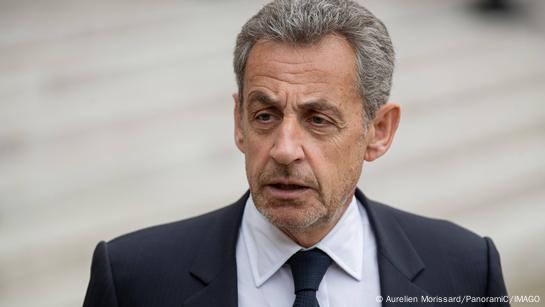
Ex-French President Nicolas Sarkozy Sentenced to 5 Years in Prison Over Gaddafi Campaign Funding Scandal

History was made in Paris today as Nicolas Sarkozy, France’s former president and once one of Europe’s most influential leaders, was sentenced to five years in prison after being convicted of cr!minal conspiracy in a case that has shadowed his career for more than a decade.
The Paris court ruled that Sarkozy, now 70, was part of a network that conspired to prepare a corr¥ption offence between 2005 and 2007, during the turbulent period leading up to his 2007 presidential victory.
At the center of the case were explosive allegations: that Sarkozy’s campaign was secretly bankrolled by the regime of late Libyan dictator Muammar Gaddafi. What began as whispers of suitcases stuffed with cash, offshore transfers, and questionable trips to Tripoli has culminated in a verdict that shatters the image of a man who once walked proudly on the global stage with the likes of Angela Merkel, Barack Obama, and Vladimir Putin.
The ruling was unflinching. Sarkozy was handed a five-year prison term, fined €100,000, and barred from holding any public office for five years. While the sentence comes with “deferred effect,” meaning he won’t be jailed immediately, French prosecutors are required to summon him within a month to formally notify him of his imprisonment date. Authorities made it clear that any appeal filed by Sarkozy will not suspend this enforcement, underscoring the severity of the ruling.
Though Sarkozy was acquitted on charges of passive corr¥ption, embezzlement of Libyan public funds, and illegal campaign financing, the conviction is unprecedented. Never before has a former French head of state been found guilty of participating in a conspiracy of this scale, one tied to foreign money and the shadowy dealings of a toppled regime. Prosecutors highlighted a series of suspicious elements: Sarkozy’s frequent trips to Libya in 2005, records of offshore transactions, and damning documents explicitly referencing “payments for Sarkozy.” They even raised suspicions surrounding the mysterious death of a Libyan oil minister who allegedly had knowledge of the illicit financial arrangements.
The former president has never wavered in his denials. For years, Sarkozy has branded the case a witch hunt, claiming there is “not a shred of proof” connecting him to Gaddafi’s millions. His legal team echoed that sentiment during the trial, arguing that the charges rested on fabricated documents, unreliable testimony, and political motivations aimed at tarnishing his legacy. But the Paris court disagreed, and in doing so, has written a new chapter in French political history.
This conviction is not Sarkozy’s first brush with the law. His once-glittering political career has become increasingly defined by courtroom battles. In the infamous “Bygmalion affair,” Sarkozy was found guilty of overspending on his failed 2012 re-election campaign, a scandal that exposed a web of fake invoices and fraudulent accounting. In the separate “Bismuth case,” he was convicted of influence peddling and illegal wiretapping, resulting in a sentence that he partially served under house arrest with an electronic ankle bracelet — an extraordinary fall from grace for a man who once commanded the Élysée Palace.
With the latest conviction, Sarkozy’s legal troubles appear far from over. He has already vowed to appeal and is also pursuing a case at the European Court of Human Rights, arguing that his right to a fair trial has been violated. Yet each ruling chips further away at the aura of invincibility he once carried, raising questions about whether history will remember him as a reformist president who sought to modernize France or as a cautionary tale of power consumed by scandal.
The implications of this case stretch beyond Sarkozy himself. France, a nation that prides itself on its republican values and the rule of law, now confronts the uncomfortable reality that one of its leaders may have traded integrity for illicit wealth. It is also a sobering reminder of the enduring influence of Muammar Gaddafi, whose regime, though toppled in 2011, continues to cast shadows over European politics. The image of Sarkozy embracing the Libyan strongman in Tripoli, once hailed as a symbol of diplomatic engagement, now returns as haunting evidence in a courtroom drama.
For Sarkozy’s supporters, the verdict is devastating. For his critics, it is long overdue vindication. And for France, it is a moment of reckoning. As Sarkozy prepares to face the prospect of imprisonment, the question lingers: how does a country reconcile the legacy of a president who once promised to restore its grandeur, only to be remembered in handcuffs and legal battles?
The courtroom doors may have closed on this particular chapter, but the ripple effects are only beginning. Nicolas Sarkozy, once the man who carried France’s destiny in his hands, now finds himself fighting for his freedom, his reputation, and what little remains of his political legacy.

